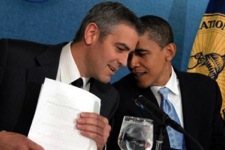By: Kaitlyn Walker
Barack Obama is certainly not the first president to unite with Hollywood power-players (Kennedy, Clinton, and Reagan all utilized the power of the celebrity fundraiser). Nevertheless, the results of his collaborations with Tinseltown are rapidly reaching unprecedented proportions. In a George Clooney-sponsored affair, the Obama campaign amassed an astonishing $15 million dollars, ranking amongst the most lucrative fundraising events ever held. The truly unique feature of the fundraiser is, in truth, not the fundraiser itself, but rather the domino effect it has initiated. Celebrities ranging from Sarah Jessica Parker to Ryan Murphy (creator of the television series “Glee”) have pledged to organize fundraisers for the President’s re-election campaign. Whether the apparent “celebrification” of politics at the presidential level will have a beneficial or adverse impact on political culture is contestable, but the string of willing celebrity fundraisers, in combination with the vast wealth of Hollywood, will likely make these fundraisers a commonplace feature of campaigns in the future.
Advantages
The most obvious argument in favor of large-scale celebrity fundraisers is simply that celebrities are above all else citizens who have the right, even the duty, to organize politically. Civic participation is a revered freedom granted to US citizens; to deny this right would be ultimately tyrannical. Arguments against celebrity fundraisers are weak in the respect that they indirectly seek to limit the influence a specific segment of society can have on an election campaign. These arguments are palatable to the public because celebrities are viewed as an elite, separate part of America, thus disconnected from the majority of the citizenry. If, however, some of the public called for an end to, say, fundraising campaigns organized by Hispanics, Americans would quickly perceive this injustice. Arguing for the limitation of fundraisers based on socioeconomic status justifies limits based upon race, ethnicity, or sexuality.
A second argument for celebrity fundraisers is youth participation in politics. This is the same basic concept behind NFL collaborations with “Play 60” or celebrities wearing the Gap Red HIV/AIDS t-shirts. People are often motivated towards certain behaviors if they see their idols taking up a cause. As celebrity-hosted fundraisers become more commonplace, they create a perception that celebrities value political participation. The result could be an increased youth interest in politics, as celebrity involvement makes the idea of participation exciting, simultaneously aligning the ordinary citizen with his or her favorite celebrity. While there is no guarantee that this strategy would be successful, the historically low rate of electoral turnout amongst the 18-24 demographic warrants an exploration of the celebrity campaign element.
Disadvantages
A principle concern with the “celebrification” of election campaigns is the risk that, in making politics more intertwined with popular culture, it risks making political participation passé when celebrity interest declines. Take the KONY 2012 phenomenon. In the aftermath of the now infamous YouTube video, there was widespread, almost feverish support amongst celebrities and non-celebrities alike to bring Joseph Kony to justice. Over the course of only a few months, the enthusiasm verily subsided. If political participation became vogue, the chance that it would just as quickly be abandoned increases. To make political participation a permanent part of American culture, it has to reside on a plane higher than celebrities and reality television.
A second concern with the surge of celebrity fundraisers is that, were these funds a key factor enabling a candidate to be elected, it is possible the president is a representation of the interests of a select group of citizens, rather than the nation as a whole. Factors like electorate preference and voter satisfaction with the incumbent president certainly mitigate this risk, but do not eliminate it entirely. Generally, the candidate best able to garner campaign funds is the victor, and it is through this avenue that celebrities could have undue influence.
Conclusion
A “celebrified” presidency is more of a reality now than ever before. The outpouring of willingness amongst celebrities to host fundraising events has accelerated a tradition dating well into the 1960s. Uncertainties in how this demographic of devoted fundraisers will likely not be resolved in the 2012 campaign, but the marked success of the Obama fundraisers have made this strategy promising frontier for future campaigns, and its cultivation could mean prospectors (at least the political kind) will bring back the biggest gold rush California has seen since 1840.
